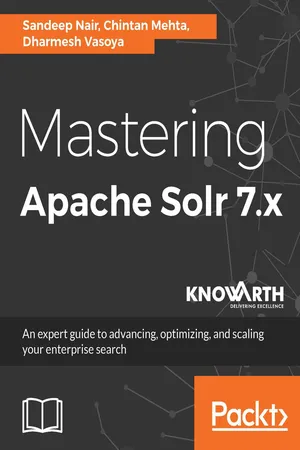
- English
- ePUB (mobile friendly)
- Available on iOS & Android
Mastering Apache Solr 7.x
About this book
Accelerate your enterprise search engine and bring relevancy in your search analyticsAbout This Book• A practical guide in building expertise with Indexing, Faceting, Clustering and Pagination• Master the management and administration of Enterprise Search Applications and services seamlessly• Handle multiple data inputs such as JSON, xml, pdf, doc, xls, ppt, csv and much more.Who This Book Is ForThe book would rightly appeal to developers, software engineers, data engineers and database architects who are building or seeking to build enterprise-wide effective search engines for business intelligence. Prior experience of Apache Solr or Java programming is must to take the best of this book.What You Will Learn• Design schema using schema API to access data in the database• Advance querying and fine-tuning techniques for better performance• Get to grips with indexing using Client API• Set up a fault tolerant and highly available server with newer distributed capabilities, SolrCloud• Explore Apache Tika to upload data with Solr Cell• Understand different data operations that can be done while indexing• Master advanced querying through Velocity Search UI, faceting and Query Re-ranking, pagination and spatial search• Learn to use JavaScript, Python, SolrJ and Ruby for interacting with SolrIn DetailApache Solr is the only standalone enterprise search server with a REST-like application interface. providing highly scalable, distributed search and index replication for many of the world's largest internet sites.To begin with, you would be introduced to how you perform full text search, multiple filter search, perform dynamic clustering and so on helping you to brush up the basics of Apache Solr. You will also explore the new features and advanced options released in Apache Solr 7.x which will get you numerous performance aspects and making data investigation simpler, easier and powerful. You will learn to build complex queries, extensive filters and how are they compiled in your system to bring relevance in your search tools. You will learn to carry out Solr scoring, elements affecting the document score and how you can optimize or tune the score for the application at hand. You will learn to extract features of documents, writing complex queries in re-ranking the documents. You will also learn advanced options helping you to know what content is indexed and how the extracted content is indexed. Throughout the book, you would go through complex problems with solutions along with varied approaches to tackle your business needs. By the end of this book, you will gain advanced proficiency to build out-of-box smart search solutions for your enterprise demands.Style and approachAn advance guide which will take you through complex problems with solutions along with varied approaches to tackle your business needs by using Apache solr 7.x
Tools to learn more effectively

Saving Books

Keyword Search

Annotating Text

Listen to it instead
Information
Advanced Queries – Part I
- Highlighting
- Spell checking
- Reranking
- Transformation of results
- Suggested words
- Pagination on results
- Expand and collapse
- Grouping and clustering
- Spatial search
- More like this word
- Autocomplete
Search relevance
- An income tax department in the context of their duty
- Chartered accountants in the context of their professional interest
- Students in the context of gaining knowledge
- Precision: Precision is the percentage of documents in the returned results that are relevant.
- Recall: Recall is the percentage of relevant results returned out of all relevant results in the system. Retrieving perfect recall is insignificant, for example, returning every document for every query.
Velocity search UI

Query parsing and syntax
- Standard query parser
- DisMax query parser
- Extended DisMax (eDisMax) query parser
Common query parameters
| Parameter | Behavior | Default value |
| defType | Selects the query parser: defType=dismax | Lucene (standard query parser) |
| sort | Sorts the search results in either ascending or descending order. The value can be specified as asc or ASC and desc or DESC. Sorting is supported by numerical or alphabetical content. Solr supports sorting by field clones. Example:
| desc |
| start | Specifies the starting point from where the results should begin displaying. | 0 |
| rows | Specifies the maximum number of do... |
Table of contents
- Title Page
- Copyright and Credits
- Packt Upsell
- Contributors
- Preface
- Introduction to Solr 7
- Getting Started
- Designing Schemas
- Mastering Text Analysis Methodologies
- Data Indexing and Operations
- Advanced Queries – Part I
- Advanced Queries – Part II
- Managing and Fine-Tuning Solr
- Client APIs – An Overview
Frequently asked questions
- Essential is ideal for learners and professionals who enjoy exploring a wide range of subjects. Access the Essential Library with 800,000+ trusted titles and best-sellers across business, personal growth, and the humanities. Includes unlimited reading time and Standard Read Aloud voice.
- Complete: Perfect for advanced learners and researchers needing full, unrestricted access. Unlock 1.4M+ books across hundreds of subjects, including academic and specialized titles. The Complete Plan also includes advanced features like Premium Read Aloud and Research Assistant.
Please note we cannot support devices running on iOS 13 and Android 7 or earlier. Learn more about using the app